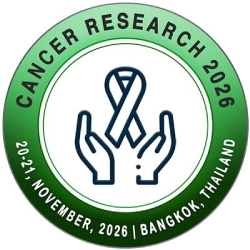Track: Advances In Cancer Research And Treatment

Advances in cancer research and treatment session will cover the latest breakthroughs in cancer research and the evolving landscape of treatment options. Experts will delve into cutting-edge developments, including personalized medicine, immunotherapy, targeted therapies, and advancements in surgical techniques. Attendees will gain an understanding of how these innovations are reshaping cancer care, offering hope for improved patient outcomes and survival rates.
Surgery:
Explore the vital role of surgery in cancer management, including advancements in minimally invasive techniques, robotic-assisted procedures, and precision surgeries. Surgery sub-session will focus on improving outcomes, recovery, and the importance of surgical expertise.
Chemotherapy:
Gain insights into the latest advancements in chemotherapy, including improved drug formulations, personalized treatment regimens, and strategies to minimize side effects. Chemotherapy sub-session will explore current protocols and emerging therapies enhancing cancer treatment effectiveness.
Immunotherapy:
Explore the transformative role of immunotherapy in cancer treatment. This sub-session will cover breakthrough approaches, including checkpoint inhibitors and CAR-T cell therapy, discussing their effectiveness, challenges, and future directions for personalized cancer care.
Targeted Therapy:
Explore the principles and progress of targeted therapy in cancer treatment. This sub-session will discuss how therapies are designed to target specific cancer cells, minimizing damage to healthy tissue and improving treatment efficacy and patient outcomes.
Hormone Therapy:
Learn about the role of hormone therapy in treating hormone-sensitive cancers such as breast and prostate cancer. Hormone Therapy session will cover mechanisms, benefits, side effects, and recent advancements, offering insights for personalized patient care.
Bone Marrow and Stem Cell Transplants:
Explore the role of bone marrow and stem cell transplants in cancer treatment. This sub-session will cover advancements, patient selection, procedure techniques, and post-transplant care, offering insights into enhancing survival and quality of life.
Scientific Highlights
- Oncogenesis
- Cancer Cell Biology & Genetics
- Precision Medicine and Personalized Oncology
- Immuno Oncology and Cancer Immunotherapy
- Advances In Cancer Research And Treatment
- Cancer Imaging Techniques
- Diagnosis and Treatment of Cancer
- Breast Cancer
- Gynecologic cancer
- Head and Neck Cancer
- Pediatric Cancer
- Neuro Oncology
- Cardio Oncology
- Covid and Its Impact on Cancer
- Oncology Nursing and Care


